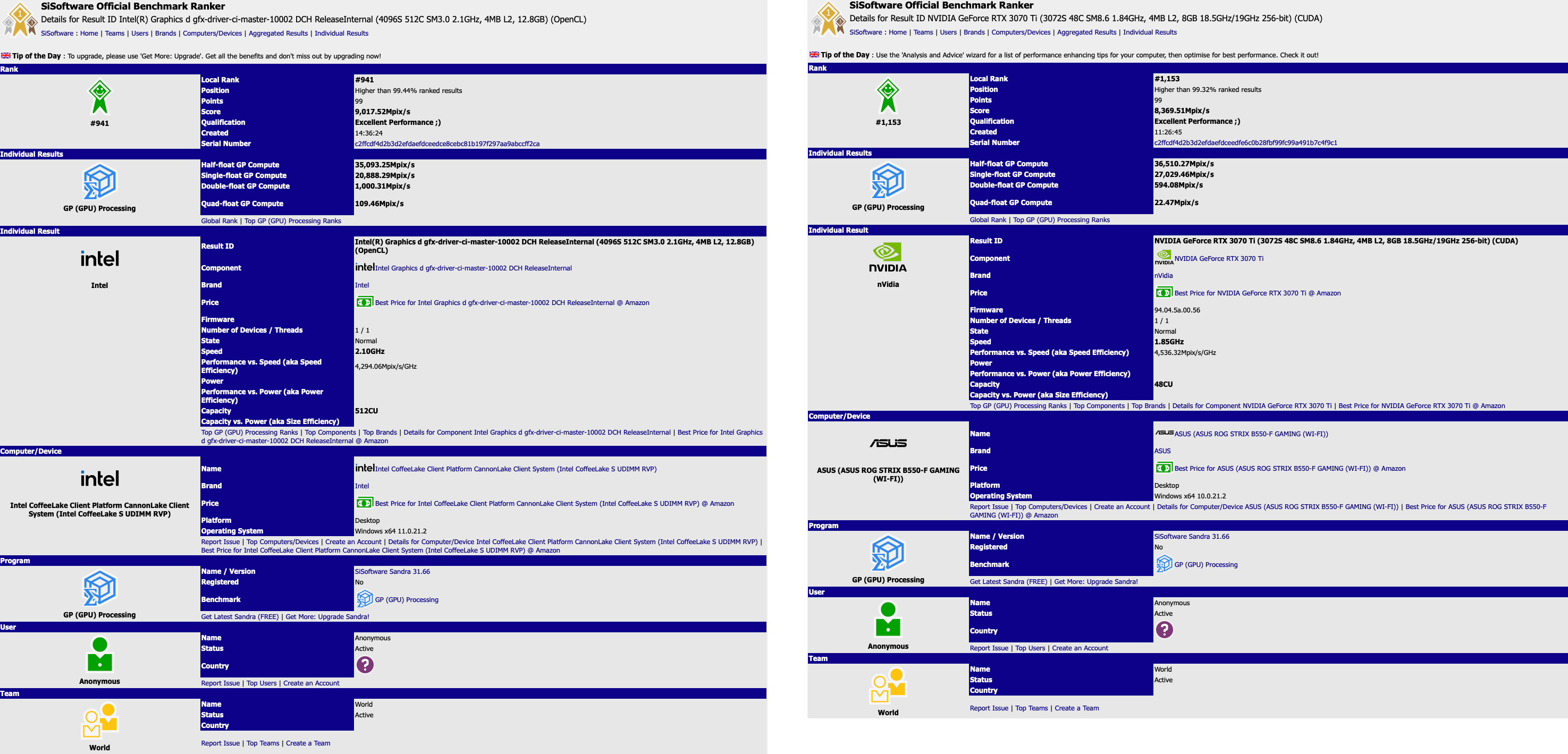Intel's Flagship GPU Arc Alchemist Trades Blows With 3070 Ti in Alleged Benchmarks
First benchmarks of Intel's Arc Alchemist emerge.
The first alleged benchmark results of one of Intel's upcoming Arc Alchemist graphics cards with a GPU featuring 512 execution units (EUs, also known as vector engines) have been published in SiSoftware Sandra's Benchmark Ranker and uncovered by @Tum_Apisak. The overall GPU compute score for Intel's forthcoming discrete GPU is higher than Nvidia's high-end GeForce RTX 3070 Ti, but take these scores with a pinch of salt for now.
The score of Intel's presumably flagship desktop discrete Arc Alchemist GPU has been submitted by an unknown person (or persons) to the database. The GPU features 512 EUs engines (which correspond to 4096 stream processors), has 4MB of L2 cache and operates at 2.1 GHz. The board is equipped with 12.8GB of usable memory, which probably means 16GB of memory in total. See more details about the test setup below.
Intel's Arc Alchemist Xe-HPG 512VE/4096SP vs. Nvidia's GeForce RTX 3070 Ti
| Row 0 - Cell 0 | Arc Alchemist Xe-HPG 512 (MPix/s) | GeForce RTX 3070 Ti (MPix/s) |
| FP16 | Half-float GP | 35,093 | 36,510 |
| FP32 | Single-float GP | 20,888 | 27,029 |
| FP64 | Double-float GP | 1,000 | 594 |
| FP128 | Quad-float GP | 109 | 22 |
| Score | 9017.52 | 8369.51 |
Assuming that the results submitted to SiSoftware Sandra's Benchmark Ranker are accurate and the drivers are mature enough, the overall score of 9017.52 Mpix/s looks quite good, exceeding Nvidia's GeForce RTX 3070 Ti that hits 8369.51 MPix/s. But the devil is in the details.
When it comes to FP32 GPU compute workloads — a precision that graphics applications use the most these days, the discrete Arc Alchemist GPU is around 23% behind its competitor GA104 with 6144 stream processors at 1440 MHz – 1850 MHz. This is not exactly a spectacular result, at least as performance in FP32 compute workloads is concerned. Of course, we are not dealing with commercial hardware or software here, so take the information with a grain of salt. Perhaps Intel's actual flagship Arc Alchemist will perform considerably better.
Intel's Arc Alchemist Xe-512 performs on par with Nvidia's GeForce RTX 3070 Ti in FP16 GPU compute workloads, which are not widely used for graphics. Meanwhile, the Xe-HPG GPU outperforms Nvidia's GA104 by 68% in FP64 GPU compute workloads, and by almost 5 times in FP128 GPU compute workloads, but neither FP64 nor FP128 are used by graphics applications and are reserved for high-performance computing.
The result published in SiSoftware Sandra's Benchmark Ranker is marked as 'Intel(R) Graphics d gfx-driver-ci-master-10002 DCH Release Internal (4096S 512C SM3.0 2.1GHz, 4MB L2, 12.8GB) (OpenCL),' so we are dealing with a sample and the driver meant for internal testing. The testing was conducted on Intel's 'CoffeeLake Client Platform CannonLake Client System (Intel CoffeeLake S UDIMM RVP),' a reference validation platform used primarily for Intel's internal testing.
While the Intel Arc Alchemist Xe-512 benchmark results should be taken with discretion, these are the first performance numbers for the part, so we at least have some food for the thought.
Get Tom's Hardware's best news and in-depth reviews, straight to your inbox.

Anton Shilov is a contributing writer at Tom’s Hardware. Over the past couple of decades, he has covered everything from CPUs and GPUs to supercomputers and from modern process technologies and latest fab tools to high-tech industry trends.
-
VforV ReplyScore9017.528369.51
For Intel Arc DG2 512 and 3070 Ti, respectively.
I just did the benchmark now for my RX 6700 XT OC-ed and I got 8597.56 score. Stock is about 7900-8000.
If this performance translates into gaming too, it's good news in that department. We shall see that when the trusted reviews come.
The biggest issue will not be performance, but availability and MSRP vs actual price in shops... -
LolaGT If it is legitimately in the ballpark somewhere between a 3060 ti and a 3080 then intel did their homework.Reply
It won't matter if one can't find or buy one, though. That is almost guaranteed to be the case unless one pays scalper prices. -
brandonjclark I think the biggest issue will be the DRIVER SUPPORT. Will intel know enough this early into their venture to work with dev houses\publishers to maximize driver performance and will they do this consistently like nVidia?Reply
